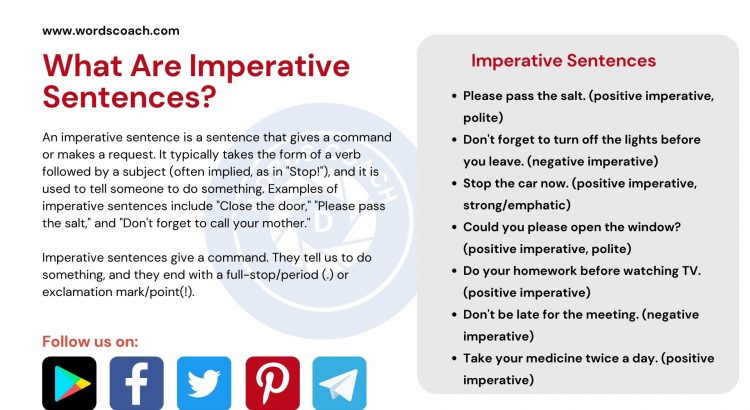Imperative sentences give a command. They tell us to do something, and they end with a full-stop/period (.) or exclamation mark/point(!).
The usual word order for the imperative sentence is:
base verb…
What Are Imperative Sentences?
An imperative sentence is a sentence that gives a command or makes a request. It typically takes the form of a verb followed by a subject (often implied, as in “Stop!”), and it is used to tell someone to do something. Examples of imperative sentences include “Close the door,” “Please pass the salt,” and “Don’t forget to call your mother.”

Types of Imperative Sentences
There are several types of imperative sentences, including:
- Positive imperatives: These are commands or requests that tell someone to do something, such as “Please bring me a glass of water.”
- Negative imperatives: These are commands or requests that tell someone not to do something, such as “Don’t touch that.”
- Polite imperatives: These are commands or requests that are phrased in a polite or courteous manner, such as “Could you please help me with this?”
- Strong/Emphatic imperatives: These are commands or requests that are phrased strongly or with emphasis, such as “Do it now!” or “You must leave now!”
- Soft imperatives: These are commands or requests that are phrased softly or mildly, such as “Would you mind closing the window?” or “Can you lend me a hand?”
In addition to these types, Imperative sentence can be short and simple or complex and compound.
Uses of Imperative Sentences
Imperative sentences are often used to give instructions, commands, or directions, such as in cooking recipes, instructional manuals, or emergency procedures. They can also be used to make requests, such as asking someone to pass an object or to perform a specific action.
In addition, imperative sentences can be used to give advice or make suggestions, such as “You should take a break” or “You should eat healthy food.”
Imperative sentences are also often used in persuasive writing and advertising, as they can be used to convince or persuade someone to take a specific action, such as “Buy our product today!” or “Sign up for our newsletter now!”
Also it’s used in literature to give life to the characters and make the situation more vivid and realistic.
In general, imperative sentences are a useful tool for expressing a wide range of meaning and intent, from giving simple commands to making polite requests and giving advice.
Examples of Imperative Sentences
- Please pass the salt. (positive imperative, polite)
- Don’t forget to turn off the lights before you leave. (negative imperative)
- Stop the car now. (positive imperative, strong/emphatic)
- Could you please open the window? (positive imperative, polite)
- Do your homework before watching TV. (positive imperative)
- Don’t be late for the meeting. (negative imperative)
- Take your medicine twice a day. (positive imperative)
- Leave me alone. (positive imperative, strong/emphatic)
- Please pick up your toys. (positive imperative, polite)
- Don’t litter in the park. (negative imperative)
In literature,
- “To be, or not to be, that is the question.” – Hamlet (Shakespeare)
- “It was the best of times, it was the worst of times.” – A Tale of Two Cities (Dickens)
- “Call me Ishmael.” – Moby-Dick (Melville)
- “I am an invisible man.” – Invisible Man (Ellison)
- “I am legend.” – I Am Legend (Matheson)
As you can see, imperative sentences can be used in many different contexts and can express a wide range of meanings depending on the words used and the way they are phrased.

